
[That I had] much romping in the open air, [a] long walk to school, and the companionship of unusually robust boys, caused my mother grievous suffering; but this did not prevent me from becoming the opposite of a stay-at-home. And although at that time I had scarcely any thought about my future career, I had decidedly no sympathy for the course my father's career had taken. I believe that even then my talent for making speeches was being developed, in the more or less violent arguments with my schoolfellows. I had become a little ringleader, and at school learned easily and well, but was otherwise rather difficult to handle.
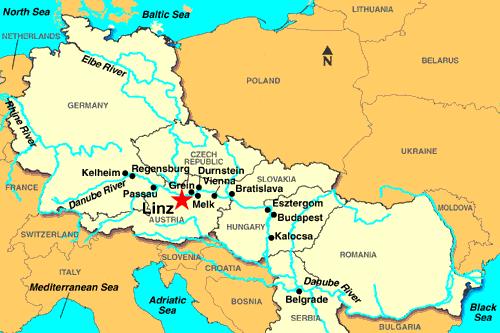
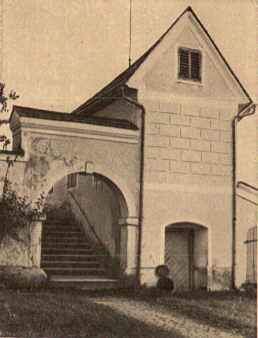
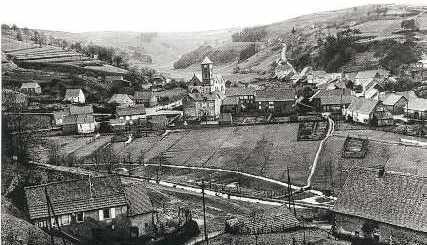
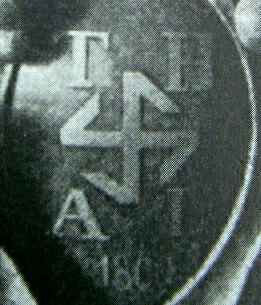
Since, in my free time, I received singing lessons in the cloister at Lambach, I had excellent opportunity to intoxicate myself with the solemn splendor of the brilliant church festivals. It seemed to me perfectly natural to regard the abbot as the highest and most desirable ideal, just as my father regarded the village priest as his ideal.
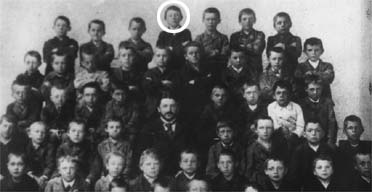
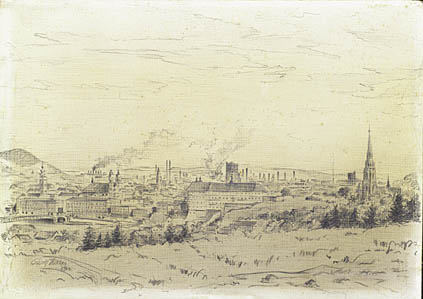
Adolfs attitude becomes sullen and he begins to receive less than exemplary marks in school, including an "erratic" in diligence with failing marks in natural history and math. He will have to repeat this first class altogether the following year.
The move from Gymnasium--which taught a more classical education, with such subjects as Latin--to the Realschule, with its more technical curriculum, is often thought curious because it was not a traditional path to the civil service, which is the path old Alois desired Adolf to take. However, Alois himself did not take the traditional path either, making the choice perhaps somewhat less curious.
Adolf’s fellow classmate, Josef Keplinger: "He (Hitler) had 'guts.' He wasn't a hothead but really more amenable than a good many. He exhibited two extremes of character which are not often seen in unison, he was a quiet fanatic."
One of Adolf's teachers at Linz Realschule, a Professor Theodor Gissinger, would say: "I remember that he used to hold conversations with the wind-blown trees."
The recent death of his brother Edmund, to whom he was attached, may be a factor in the boy's academic decline. Even more pertinent, perhaps, is the fact that the Realschule is a new experience for Adolf, much larger than any school he had ever attended, and therefore with much more competition. Dimensions reverse unfavorably for him, as he is no longer a big fish in a small pond. Then there is the growing struggle with old Alois. The concentration of parental energies on Adolf's education is having (typically) the opposite effect from that intended: The boy rebels.19
Hitler, from Mein Kampf:
But now, to be sure, there was a new conflict to be fought out. As long as my father's intention of making me a civil servant encountered only my theoretical distaste for the profession, the conflict was bearable. Thus far, I had to some extent been able to keep my private opinions to myself; I did not always have to contradict him immediately. My own firm determination never to become a civil servant sufficed to give me complete inner peace. And this decision in me was immutable.
The problem became more difficult when I developed a plan of my own in opposition to my father's. And this occurred at the early age of twelve. How it happened, I myself do not know, but one day it became clear to me that I would become a painter, an artist. There was no doubt as to my talent for drawing; it had been one of my father's reasons for sending me to the Realschule, but never in all the world would it have occurred to him to give me professional training in this direction. On the contrary. When for the first time, after once again rejecting my father's favorite notion, I was asked what I myself wanted to be, and I rather abruptly blurted out the decision I had meanwhile made, my father for the moment was struck speechless. "Painter ... Artist?"
He doubted my sanity, or perhaps he thought he had misheard or misunderstood me. But when he was clear on the subject, and particularly after he felt the seriousness of my intention, he opposed it with all the determination of his nature. His decision was extremely simple, for any consideration of what abilities I might really have was simply out of the question. "Artist, no, never as long as I live!" But since his son, among various other qualities, had apparently inherited his father's stubbornness, the same answer came back at him. Except, of course, that it was in the opposite sense. And thus the situation remained on both sides. My father did not depart from his "Never!" And I intensified my "Oh, yes!" The consequences, indeed, were none too pleasant.
The old man grew embittered, and, much as I loved him, so did I. My father forbade me to nourish the slightest hope of ever being allowed to study art. I went one step further and declared that if that was the case I would stop studying altogether. As a result of such "pronouncements" of course, I drew the short end; the old man began the relentless enforcement of his authority. In the future, therefore, I was silent, but transformed my threat into reality. I thought that once my father saw how little progress I was making at the Realschule, he would let me devote myself to my dream, whether he liked it or not. I do not know whether this calculation was correct. For the moment only one thing was certain: my obvious lack of success at school.
Whether the young Adolf, allegedly at the age of twelve, so plainly stipulated he wanted to be an artist may be doubted. But that there was a conflict with his father arising from his unwillingness to follow a career in the civil service, and that his father found fault with his son's indolent and purposeless existence, in which drawing seemed to be his main interest, seems certain.20
Hitler, from Mein Kampf:Rummaging through my father's library, I had come across various books of a military nature, among them a popular edition of the Franco-German War of 1870-7I. It consisted of two issues of an illustrated periodical from those years, which now became my favorite reading matter. It was not long before the great heroic struggle had become my greatest inner experience. From then on I became more and more enthusiastic about everything that was in any way connected with war or, for that matter, with soldiering.
August 1902: While hauling a load of coal to his cellar, Alois Hitler suffers a lung hemorrhage. It is not considered serious, and he is soon fully recovered and back on his feet.24January 3, 1903: On this bitterly cold Saturday morning, Alois Hitler collapses while walking through town to confer with a local farmer about purchasing some apples. Helped to a nearby inn--the Gasthaus Stiefler--by some passers-by, Alois gives up the ghost in the arms of his neighbor, Ransmaier, while waiting for a hastily ordered glass of wine.25
From Mein Kampf:
When I was thirteen my father died suddenly. The old gentleman, who was always so robust and healthy, suffered an apoplectic stroke, and thus painlessly ended his wanderings on earth, plunging us all into the depths of despair. His most ardent desire had been to help his son forge his career, thus preserving him from his own bitter experience. In this, to all appearances, he had not succeeded. But, though unwittingly, he had sown the seed for a future which at that time neither he nor I would have comprehended.
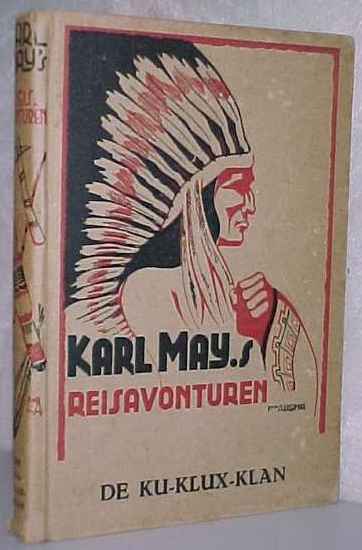
I well remember the gaunt, pale-faced boy who shuttled backwards and forwards between Linz and Leonding. Hitler was certainly gifted, although only for particular subjects. He lacked self-control and, to say the least, he was considered argumentative, autocratic, self-opinionated and bad-tempered, and unable to submit to school discipline. Nor was he industrious; otherwise he would have achieved much better results, gifted as he was. He reacted with ill-concealed hostility whenever a teacher reproved him or gave him some advice. At the same time, he demanded the unqualified subservience of his fellow-pupils, fancying himself in the role of a leader, and of course playing many small harmless pranks, which is not unusual among immature youngsters. He seemed to be infected with the stories of Karl May and the Redskins.

Paula Hitler:
Of my other brothers and sisters I especially remember my stepsister Angela as a beautiful girl. Also she was watched by my father very harshly. He was examining every wooer with the strict demand that only a civil servant was allowed to marry her. Really in 1903 she married the Revenue officer Leo Raubal in Linz, who died very young in 1910. After his death my sister with her 3 children went on to live in Linz for a short time. Then she removed to Vienna. Later on she married the university professor Hammitzsch in Dresden. They had no children.


Father Franz Sales Schwartz, Adolf's religion teacher at Linz Realschule, is described as short, fat, ugly, and no match for the wit and wisdom of the precocious youth. When Schwartz asks him if he takes care to pray at least three times a day, he has himself replying, "No sir, I never say my prayers. Why should God be interested in the prayers of a schoolboy?"
While Klara Hitler is at the school conferring with Father Schwartz about Adolf's poor marks, the priest turns to him and says, "You poor, unhappy boy." "I'm not unhappy at all," Adolf declares. "Yes you are," insists Schwarz, "and you'll realize how unhappy you are when you enter the next world." Hitler responds, "I have heard about scientists who doubt whether there is a next world." The startled priest now makes a strategic error and addresses the lad with the familiar 'Du,' "What do you mean?" Taking full advantage of this breach of etiquette, Adolf answers in tones of outrage and formal dignity, "I must inform you, sir, that you are addressing me with the familiar 'Du.'" Schwartz: "Well, you won't go to heaven." The adult dictator will still take satisfaction nearly forty years later from his rhetorical argument-ending triumph, "Not even if I buy an indulgence?"
Hitler: A bright youngster of thirteen or fourteen can always get the better of a professor dulled by the grind of years of teaching.
Hitler: Our teachers were absolute tyrants. They had no sympathy with youth; their one object was to stuff our brains and turn us into erudite apes like themselves. If any pupil showed the slightest trace of originality, they persecuted him relentlessly, and the only model pupils whom I ever got to know have all been failures in after-life.
To "learn" history means to seek and find the forces which are the causes leading to those effects which we subsequently perceive as historical events. The art of reading as of learning is this: to retain the essential and to forget the non-essential. Perhaps it affected my whole later life that good fortune sent me a history teacher who was one of the few to observe this principle in teaching and examining. Dr. Leopold Potsch,38 my professor at the Realschule in Linz, embodied this requirement to an ideal degree. This old gentleman's manner was as kind as it was determined, his dazzling eloquence not only held us spellbound but actually carried us away.
Even today I think back with gentle emotion on this gray-haired man who, by the fire of his narratives, sometimes made us forget the present; who, as if by enchantment, carried us into past times and, out of the millennial veils of mist, molded dry historical memories into living reality. On such occasions we sat there, often aflame with enthusiasm, and sometimes even moved to tears. What made our good fortune all the greater was that this teacher knew how to illuminate the past by examples from the present, and how from the past to draw inferences for the present. As a result he had more understanding than anyone else for all the daily problems which then held us breathless.
He used our budding nationalistic fanaticism as a means of educating us, frequently appealing to our sense of national honor. By this alone he was able to discipline us little ruffians more easily than would have been possible by any other means. This teacher made history my favorite subject. And indeed, though he had no such intention, it was then that I became a little revolutionary.
(Graded 1 for "excellent" to 5 for "inadequate")
1901-02 1902-03 1903-04
Religion 2 2 2
German 4 4 4
French 5 5 5
Geography 3 2 2
History x x 3
Mathematics 3 3 3
Nat. History 2 2 x
Physics x x 3
Geometrical Drawing 1 2 2
Freehand Drawing 4 4 4
Handwriting 1 1 x
Gymnastics 2 2 2
September 1904: Adolf Hitler begins at the Steyr Realschule. As it is too far to commute, he boards with thirty-one year old Petronella Cichini and her elderly husband, and another Realschule pupil.41
Summer 1905: The Hitler family, as usual, passes the summer months in Spital with Klara's relatives, including Aunt Theresa and Uncle Anton Schmidt, Klara's mother, Johanna Poelzl, and a large collection of cousins.42 This summer, the usually active boy comes down with a respiratory ailment that curtails his activities. Dr. Karl Keiss travels to Spital from nearby Weitra to examine him, and renders a diagnosis of consumption. By playing on Klara's sympathies, Adolf will utilize this timely illness in his soon-to-be-successful campaign to burn his pencils and books.
It has been noted that Alois had the very same "lung ailment," yet lived to the age of 66. Dr. Keiss, for one, was convinced that Adolf's "disease" was serious: "Adolf will never be healthy after this sickness," he told Adolf's Aunt Theresia. John Toland will write:
Detractors later charged that Hitler had lied about his ill-health in Mein Kampf, but Paula testified that her brother did suffer a hemorrhage; a boyhood friend remembered that "he was plagued by coughs and nasty catarrhs, especially on damp, foggy days,' and a neighbor testified that he was "in poor health and had to leave his studies because of a lung problem--as a result of which he was spitting blood."43
September 16, 1905: After passing his geometry re-sit, sixteen-year-old Adolf Hitler leaves Steyr Realschule, ending his formal schooling.47From Mein Kampf:
What gave me pleasure I learned, especially everything which, in my opinion, I should later need as a painter. What seemed to me unimportant in this respect or was otherwise unattractive to me, I sabotaged completely. My report cards at this time, depending on the subject and my estimation of it, showed nothing but extremes. Side by side with "laudable" and "excellent," stood "adequate" or even "inadequate." By far my best accomplishments were in geography and even more so in history. These were my favorite subjects, in which I led the class.
Perusal of either Hitler report card presented here reveals that Hitler's recollections are inadequate at best. He does, however, seem to have "led the class" in gymnastics and free-hand drawing at one point (below).Hitler's Report Card from Steyr Realschule:49
1st Semester 2nd Semester
Moral Conduct 3 satisfactory 3 satisfactory
Diligence 4 unequal 4 adequate
Religion 4 adequate 3 satisfactory
German 5 inadequate 4 adequate
Geography-History 4 adequate 3 satisfactory
Mathematics 5 inadequate 3 satisfactory
Chemistry 4 adequate 4 adequate
Physics 3 satisfactory 4 adequate
Geometry, geo drawing 4 adequate 4 adequate
Freehand Drawing 2 laudable 1 excellent
Gymnastics 1 excellent 1 excellent
Stenography 5 inadequate x
Singing x 3 satisfactory
Handwriting 5 displeasing 5 displeasing

From Mein Kampf:
My mother, to be sure, felt obliged to continue my education in accordance with my father's wish; in other words, to have me study for the civil servant's career. I, for my part, was more than ever determined absolutely not to undertake this career. In proportion as my schooling departed from my ideal in subject matter and curriculum, I became more indifferent at heart.
Then suddenly an illness came to my help and in a few weeks decided my future and the eternal domestic quarrel. As a result of my serious lung ailment, a physician advised my mother in most urgent terms never to send me into an office. My attendance at the Realschule had furthermore to be interrupted for at least a year. The goal for which I had so long silently yearned, for which I had always fought, had through this event suddenly become reality almost of its own accord. Concerned over my illness, my mother finally consented to take me out of the Realschule and let me attend the Academy [of Fine Arts in Vienna].
Copyright © 2011-2013 Walther Johann von Löpp All Rights Reserved
 Twitter: @3rdReichStudies
FB: Horrific 20th Century History
Twitter: @3rdReichStudies
FB: Horrific 20th Century History




Featured Sites:Austria: The Other GermanyThe Last Days of the Third ReichAdolf Hitler: The First Super-VillianThird Reich History: What Happened Today?Countdown to Infamy: Timeline to Pearl HarborBiographical Timeline: of the Infamous Adolf HitlerCountdown To WW2: August 22 - September 1, 1939The Nuremberg Nazis: Detailed, Documented BiographiesWunderwaffen: Hitler's Deception and the History of RocketryMain Sites:
Adolf Hitler: The VolkswagenAdolf Hitler: The Fuehrer's MercedesAdolf Hitler: Mein Kampf ExaminedIn the Shadow of Frederick the GreatHitler's Battleship: Sink The Bismarck!Non-Fiction Comics: Military PeriodicalsHistory of Olympic Boycotts: From Berlin to BeijingHogan's Jews: 5 Cast Members Were Jews; Their Stories



















Disclaimer: The Propagander!™ includes diverse and controversial materials--such as excerpts from the writings of racists and anti-Semites--so that its readers can learn the nature and extent of hate and anti-Semitic discourse. It is our sincere belief that only the informed citizen can prevail over the ignorance of Racialist "thought." Far from approving these writings, The Propagander!™ condemns racism in all of its forms and manifestations.
Fair Use Notice: The Propagander!™may contain copyrighted material the use of which has not always been specifically authorized by the copyright owner. We are making such material available in our efforts to advance understanding of historical, political, human rights, economic, democracy, scientific, environmental, and social justice issues, etc. We believe this constitutes a "fair use" of any such copyrighted material as provided for in section 107 of the US Copyright Law. In accordance with Title 17 U.S.C. Section 107, the material on this site is distributed without profit to those who have expressed a prior interest in receiving the included information for research and educational purposes. If you wish to use copyrighted material from this site for purposes of your own that go beyond 'fair use', you must obtain permission from the copyright owner.
